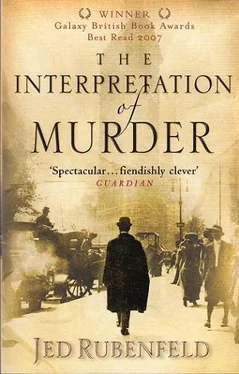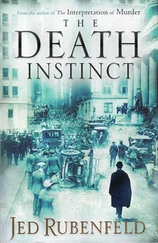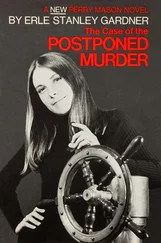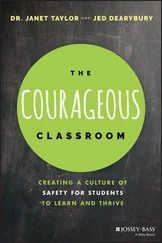Jed Rubenfeld - The Interpretation of Murder
Здесь есть возможность читать онлайн «Jed Rubenfeld - The Interpretation of Murder» весь текст электронной книги совершенно бесплатно (целиком полную версию без сокращений). В некоторых случаях можно слушать аудио, скачать через торрент в формате fb2 и присутствует краткое содержание. Жанр: Исторические приключения, на английском языке. Описание произведения, (предисловие) а так же отзывы посетителей доступны на портале библиотеки ЛибКат.
- Название:The Interpretation of Murder
- Автор:
- Жанр:
- Год:неизвестен
- ISBN:нет данных
- Рейтинг книги:5 / 5. Голосов: 1
-
Избранное:Добавить в избранное
- Отзывы:
-
Ваша оценка:
- 100
- 1
- 2
- 3
- 4
- 5
The Interpretation of Murder: краткое содержание, описание и аннотация
Предлагаем к чтению аннотацию, описание, краткое содержание или предисловие (зависит от того, что написал сам автор книги «The Interpretation of Murder»). Если вы не нашли необходимую информацию о книге — напишите в комментариях, мы постараемся отыскать её.
The Interpretation of Murder — читать онлайн бесплатно полную книгу (весь текст) целиком
Ниже представлен текст книги, разбитый по страницам. Система сохранения места последней прочитанной страницы, позволяет с удобством читать онлайн бесплатно книгу «The Interpretation of Murder», без необходимости каждый раз заново искать на чём Вы остановились. Поставьте закладку, и сможете в любой момент перейти на страницу, на которой закончили чтение.
Интервал:
Закладка:
Yanking the carriage rods out of her bridle, Banwell seized the reins and mounted the horse bareback. He drove her back into the construction site and there wheeled about until he came to the great dangling hook of the crane that loomed sky-high in the middle of the plot of ground. Taking that hook in both hands, Banwell fixed it under the horse's halter, which was in turn secured firmly around her underbelly. He leaped off the horse and shouted to the crane man, 'You there, take her up. You in the crane: take her up, I say. Can't you hear me? Take her up!'
The astonished crane man was slow to respond. At last he engaged the gears of the hulking machine. Its long cable went taut; its hook clenched at the saddle. The horse stirred and pawed at the uncomfortable sensation. For a moment nothing more happened.
'Lift, you bugger,' Banwell cried to his crane operator, 'lift or go home to your wife tonight without a job!'
The crane man manipulated the levers again. With a lurch, the horse lifted up off the ground. The moment her feet left the earth, uncomprehending panic fell upon the animal. She screamed and thrashed about, succeeding only in making herself twist wildly in the air, suspended by the crane's thick hook.
'Let her go!' a girl's voice, angry and stricken, cried out. It was Miss Acton. Watching the spectacle unfold, she had hurried across Forty-second Street and was now at the front of the crowd. Younger was right next to her, and Littlemore several rows behind. She called out again, 'Let her down. Someone, make him stop!'
'Up,' Banwell ordered. He heard the girl's voice. For a moment, he looked right at her. Then he returned his attention to the horse. 'Higher.'
The crane man did as he was bid, hoisting the creature higher and higher: twenty, thirty, forty feet above the ground. Philosophers say it cannot be known whether animals feel emotions comparable to a human's, but anyone who has seen sheer terror in a horse's eyes can never doubt it again.
Because all human eyes were on the helpless, dangling, thrashing animal, no one in the crowd noticed the stirring of the steel girder three stories up the scaffolding. This girder was secured to a rope, which was in turn connected to the crane hook. Until now that rope had been slack, the steel beam lying harmlessly in place on the scaffold. But as the hook rose, this rope too eventually pulled taut, and now, without warning, the steel girder rolled off the wooden planks. From there it swung freely. Being attached to the crane's hook, it naturally swung in the direction of the hook — which is to say, in the direction of George Banwell.
Banwell never saw the deadly girder hurtling at him, gathering speed as it swung. The beam turned inexorably in the air, so that it came at him dead on, like a gigantic spear aimed at his stomach. Had it struck, it would certainly have killed him. As it happened, it missed him by a foot. This was a stroke of excellent and not atypical good fortune for Banwell, but its consequence was that the beam flew on, now heading for the crowd, several members of whom screamed in fright, a good dozen men diving to the dirt to protect themselves.
There was only one among them, however, who should have dived away. That was Miss Nora Acton, since the twelve- foot steel girder was swinging straight toward her. Miss Acton, however, neither screamed nor moved. Whether it was because the onrushing beam held her somehow in thrall or because it was difficult to know which way to go, Miss Acton stood rooted to her spot, aghast and about to die.
Younger seized the girl by her long blond braid, pulling her hard — and not very chivalrously — into his arms. The hurtling girder whistled by them, so close the two could feel its wind, and flew high into the air behind them.
'Ow!' said Miss Acton.
'Sorry,' said Younger. Then he drew her by the hair a second time, pulling her now in the other direction.
'Ow!' said Miss Acton again, more emphatically, as the steel beam, making its return trip, flew past them once more, this time just missing the back of her head.
Banwell eyed the sailing girder dispassionately as it shot by. With disgust, he watched it soar up and slam into the scaffold from which its journey had begun, destroying that structure as if it had been made of toothpicks, sending men, tools, and wooden planks flying in all directions. When the dust cleared, only the horse was still making noise, neighing and spinning helplessly above their heads. Banwell signaled the crane man to bring her down and, with a cold rage, issued orders to his men to clear the debris.
'Take me back to my room, please,' Miss Acton said to Younger.
The crowd milled about for a long while, admiring the damage and replaying the events. The horse was returned to the coachman, whom Detective Littlemore now approached. The detective had recognized George Banwell. 'Say, how's she doing, the poor thing?' Littlemore asked the coachman. 'What is she, a Perch?'
'Half Perch,' replied the driver, trying as best he could to calm the still trembling animal. 'They call her a Cream.' 'She's a beauty, that's for sure.'
'That she is,' said the coachman, stroking the horse's nose. 'Gee, I wonder what made her rear up like that. Something she saw, probably.' 'Something he saw, more like.' 'How's that?'
'It wasn't her at all,' grumbled the coachman. 'It was him. He was trying to back her up. You can't back up a carriage horse.' He spoke to the mare. 'Tried to make you back up, that's what he did. Because he was scared.' 'Scared? Of what?'
'Ask him, why don't you? He don't scare easy, not him. Scared like he saw the devil himself.'
'How do you like that?' said Littlemore, before heading back to the hotel.
At the same moment, on the top floor of the Hotel Manhattan, Carl Jung stood on his balcony, surveying the scene below. He had seen the extraordinary events in the construction site. Those events had not only frightened him; they filled him with a profound, swelling elation — of a kind he had felt only once or twice in his entire life. He withdrew into his room, where he sat numbly on the floor, his back against the bed, seeing faces no one else could see, hearing voices no one else could hear.
Chapter Nine
When we got back to Miss Acton's rooms, Mrs Biggs was frantic. She ordered Miss Acton first to lie down, then to sit up, then to move about in order to 'get her color back.' Miss Acton paid no mind to any of these commands. She headed straight to the little kitchen with which her suite was equipped and began preparing a pot of tea. Mrs Biggs threw up her arms in protest, declaring that she should be fixing tea. The old woman would not be quiet until Miss Acton sat her down and kissed her hands.
The girl had an uncanny capacity either to regain her composure after the most overwhelming events or to affect a composure she did not feel. She finished the tea and handed a steaming cup to Mrs Biggs.
'You would have been killed, Miss Nora,' said the old woman. 'You would have been killed if not for the young doctor.'
Miss Acton placed her hand on top of the woman's, urging her to take her tea. When Mrs Biggs had done so, the girl told her she would have to leave us because she needed to speak privately with me. After a good deal more importuning, Mrs Biggs was persuaded to go.
When we were alone, Miss Acton thanked me.
'Why have you made your servant leave?' I asked.
'I did not "make" her leave,' replied the girl. 'You wanted to know the circumstances in which I lost my voice three years ago. I wish to tell you.'
The teapot now began to shake in her hands. Attempting to pour, she missed the cup altogether. She put the pot down and clasped her fingers together. 'That poor horse. How could he do such a thing?'
'You are not to blame, Miss Acton.'
Читать дальшеИнтервал:
Закладка:
Похожие книги на «The Interpretation of Murder»
Представляем Вашему вниманию похожие книги на «The Interpretation of Murder» списком для выбора. Мы отобрали схожую по названию и смыслу литературу в надежде предоставить читателям больше вариантов отыскать новые, интересные, ещё непрочитанные произведения.
Обсуждение, отзывы о книге «The Interpretation of Murder» и просто собственные мнения читателей. Оставьте ваши комментарии, напишите, что Вы думаете о произведении, его смысле или главных героях. Укажите что конкретно понравилось, а что нет, и почему Вы так считаете.












